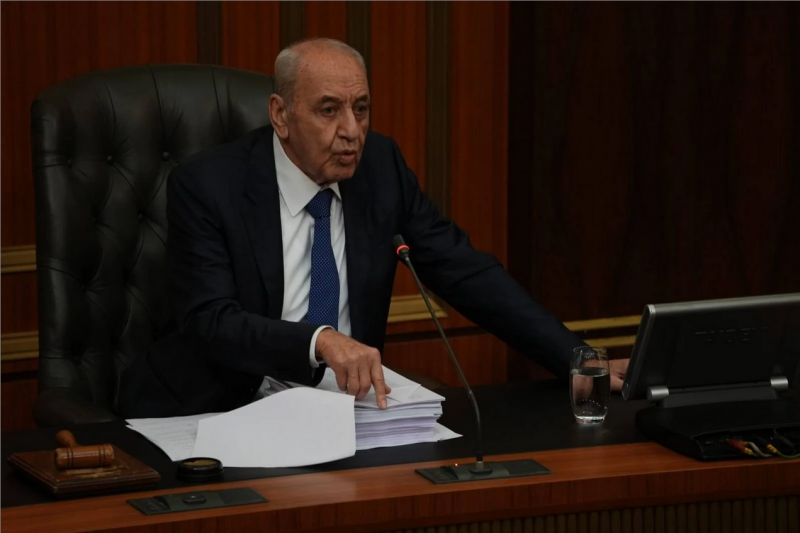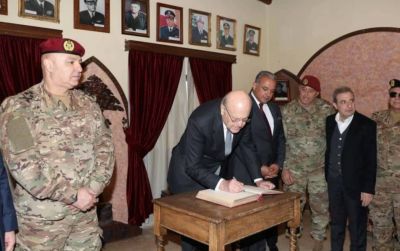
Speaker of the Lebanese Parliament, Nabih Berri, on Dec. 14, 2023 in the parliamentary chamber. (Credit: Mohammad Yassin/L'Orient Today)
BEIRUT — After dividing the day's parliamentary session into two relatively short meetings — the first lasting two-and-a-half hours in the middle of the day and the second less than two hours in the early evening — the deputies wrapped up their debates without addressing the soon-to-be-vacant position of Lebanese Army Commander-in-Chief.
They did, however, adopt several bills on the agenda, including one establishing a sovereign wealth fund to collect and administer potential revenues from the exploitation of the country's still hypothetical hydrocarbon reserves. They also had time to refer back to committee the bill introducing formal capital controls.
Another session is scheduled for Friday at 3 p.m., after the Council of Ministers meeting scheduled for the same day.
'Put an end to obstruction'
Clashes between Hezbollah and the Israeli army are raging in southern Lebanon since Oct. 8, the day after the Hamas offensive against Israel triggered the most devastating conflict in the region in recent decades.
The issue of Lebanese Army commander, whose term of office expires on Jan. 10, raised fears of a vacancy at the head of the military in a Lebanon already embroiled in serious political and economic crises and without a President of the Republic since the end of Oct. 2022. The looming vacancy has been at the center of political debate for months. While some parties, such as Samir Geagea's Lebanese Forces (LF), are in favor of extending the term, the idea met resistance from Free Patriotic Movement leader Gebran Bassil's Christian veto. Bassil has made the removal of Joseph Aoun his main priority.
Without the opposition's partial involvement, ensuring a quorum but not voting, today's session wouldn't have even taken place. The Christian opposition and the FPM rely on the Constitution to assert that during a presidential vacancy, Parliament has no right to legislate. In other words, Parliament Speaker Nabih Berri has succeeded in baiting this opposition with the issue of extending Joseph Aoun's term of office. To extend the mandate of the leader of the troops, the LF broke with their position of rejecting any parliamentary session held in the midst of a presidential vacancy.
At the end of the first part of the session, at around 1:30 p.m., Georges Adwan, MP for the Chouf and a senior official of the Lebanese Forces, told the press: "We are continuing our contacts with the other groups in order to stop the obstruction. The extension of [Joseph Aoun's] mandate can be voted in Parliament, even if it is done by the outgoing government." Ali Hassan Khalil, an Amal deputy, asserted that "the legislative sessions will determine the fate of the law extending" General Aoun's mandate, and that "the military institution will not be destabilized."
A moment of silence
The first part of the parliamentary session began at 11 a.m. with a minute of silence "in tribute to the martyrs who fell in Lebanon and Palestine."
MP Georges Adwan, addressed the Speaker of the House to ask "whether Parliament will continue to legislate even if the outgoing government were to extend the mandate of the head of the troops."
"Of course it would. Nothing to do with the government," replied Berri, seemingly determined to make the most of the Christian cover provided by the LF.
Michel Daher, independent MP for Zahleh, who was the first to suggest the possibility of Joseph Aoun remaining in his post by a decision from the government, rather than Parliament, asked Nabih Berri to "commit to keeping the item on the Joseph Aoun affair on the agenda for Thursday and Friday's sessions."
Shortly before the start of the session, Progressive Socialist Party (PSP) MP Hadi Abou al-Hosn told local television stations that today's session "will not deal with articles of double urgency," of which the extension of Joseph Aoun's term of office is one. He assured that this issue would be examined "at another session, tomorrow. We insist that the Joseph Aoun affair be discussed in Parliament tomorrow, even if the government extends his mandate."
"The priority is to avoid a vacancy at the head of the army," said Hezbollah deputy Hassan Fadlallah. "There cannot be a vacuum at the head of the military institution," he assured.
Outgoing Prime Minister Najib Mikati has also entered the debate, calling a meeting of the Council of Ministers for Friday. One possible scenario would be for the legislative session to extend beyond Thursday, dragging on before reaching the issue of extending Joseph Aoun's term. In this case, the Council of Ministers would meet Friday and the outgoing government would adopt a decision that would delay Joseph Aoun's retirement by six months — except that such a decision by the Council of Ministers would be more open to challenge before the relevant authorities.
Responsible only for current affairs since the end of Head of State Michel Aoun's time in office in Oct. 2022, the outgoing cabinet does not have the right to make appointments and therefore cannot designate a successor to the army chief.
Capital control law fails to pass
A number of items are also on the agenda for this morning's parliamentary session, including a text on capital control, renewable energies and the pension schemes of the National Social Security Fund.
During the session, the MPs adopted the first item on the agenda which decentralizes electricity generation from renewable energies. The bill establishes a legal framework authorizing the private sector – both individuals and companies – and municipalities to generate electricity and distribute it via the EDL network, whereas these prerogatives are normally reserved for public utility. The maximum capacity authorized by this text, already approved in March 2022 by the Council of Ministers, is limited to 10 MW (megawatts) per unit.
The bill introducing formal capital controls to replace restrictions illegally imposed by the country's banks since the start of the crisis in 2019 has once again been referred to parliamentary committees.
The government bill had been extensively amended and approved by joint committees on Jan. 16, after a dozen sessions. Opponents — including the Lebanese Association for Taxpayers' Rights (LATR) — see it as a disguised concession for the banks.
Last December, parliamentary Deputy Speaker Elias Bou Saab had publicly assured that the text would be "set aside" pending the finalization of the other bills that Lebanon must adopt in accordance with the preliminary agreement signed with the International Monetary Fund last April.
MPs also approved an agreement signed in March 2022 between Lebanon and the Kuwait Fund for Arab Economic Development for a loan to set up a sanitation system in the district of Batroun. The loan is for 18.2 million Kuwaiti dinars (over $59 million) and is repayable at a rate of 2.5 percent.
Elected representatives also voted in favor of an agreement signed between the European Investment Bank (EIB) and the Council for Development and Reconstruction (CDR), aimed at renovating and improving Lebanon's road network. The EIB plans to provide loans worth 151 million euros ($165 million), to which will be added a grant from the European Union as part of its Neighborhood Policy, as well as 1.8 million euros in technical assistance from the EIB. This agreement had already been approved in Oct. 2019 by the Council of Ministers, which had mandated the CDR.
MPs also approved a bill to accept a $300 million loan to Lebanon from the World Bank. This is the amount approved last May by the international organization to finance the Emergency Crisis and COVID-19 Response Social Safety Net Project (ESSN). The $300 million is in addition to the $246 million already approved by the World Bank in Jan. 2021, plus a $4 million extension granted in May 2022. Repayment terms have not been published.
Before adjourning the session, MPs also voted on a draft law establishing the transition from an end-of-service indemnity system to a retirement pension system. They had amended a number of articles from this proposal, which was approved by joint parliamentary committees at the end of November.
The vote was welcomed by National Social Security Fund (NSSF) Managing Director Mohammad Karaki, who in a press release referred to a project that had been in the pipeline for "over 20 years." He also thanked the president of the Parliament, successive ministers of labor and the International Labor Organization for bringing it to fruition.
MPs were meant to vote on another bill concerning "non-residential" rents, according to the title on the parliamentary agenda, but this topic was postponed. The bill aims to adjust to market prices the "old rents" still enjoyed by certain commercial tenants, following a system of exceptions introduced in the mid-twentieth century which allowed rents to be frozen for low-income households.
